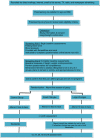Weight gain prevention in young adults: design of the study of novel approaches to weight gain prevention (SNAP) randomized controlled trial
- PMID: 23556505
- PMCID: PMC3681721
- DOI: 10.1186/1471-2458-13-300
Weight gain prevention in young adults: design of the study of novel approaches to weight gain prevention (SNAP) randomized controlled trial
Abstract
Background: Weight gain during young adulthood is common and is associated with increased cardiovascular risk. Preventing this weight gain from occurring may be critical to improving long-term health. Few studies have focused on weight gain prevention, and these studies have had limited success. SNAP (Study of Novel Approaches to Weight Gain Prevention) is an NIH-funded randomized clinical trial examining the efficacy of two novel self-regulation approaches to weight gain prevention in young adults compared to a minimal treatment control. The interventions focus on either small, consistent changes in eating and exercise behaviors, or larger, periodic changes to buffer against expected weight gains.
Methods/design: SNAP targets recruitment of six hundred young adults (18-35 years) with a body mass index between 21.0-30.0 kg/m2, who will be randomly assigned with equal probability to: (1) minimal intervention control; (2) self-regulation with Small Changes; or (3) self-regulation with Large Changes. Both interventions receive 8 weekly face-to-face group sessions, followed by 2 monthly sessions, with two 4-week refresher courses in each of subsequent years. Participants are instructed to report weight via web at least monthly thereafter, and receive monthly email feedback. Participants in Small Changes are taught to make small daily changes (~100 calorie changes) in how much or what they eat and to accumulate 2000 additional steps per day. Participants in Large Changes are taught to create a weight loss buffer of 5-10 pounds once per year to protect against anticipated weight gains. Both groups are encouraged to self-weigh daily and taught a self-regulation color zone system that specifies action depending on weight gain prevention success. Individualized treatment contact is offered to participants who report weight gains. Participants are assessed at baseline, 4 months, and then annually. The primary outcome is weight gain over an average of 3 years of follow-up; secondary outcomes include diet and physical activity behaviors, psychosocial measures, and cardiovascular disease risk factors.
Discussion: SNAP is unique in its focus on weight gain prevention in young adulthood. The trial will provide important information about whether either or both of these novel interventions are effective in preventing weight gain.
Trial registration: ClinicalTrials.gov, NCT01183689.
References
-
- Truesdale KP, Stevens J, Lewis CE, Schreiner PJ, Loria CM, Cai J. Changes in risk factors for cardiovascular disease by baseline weight status in young adults who maintain or gain weight over 15 years: the CARDIA study. Int J Obes. 2006;30(9):1397–1407. doi: 10.1038/sj.ijo.0803307. - DOI - PMC - PubMed
Publication types
MeSH terms
Associated data
Grants and funding
LinkOut - more resources
Full Text Sources
Other Literature Sources
Medical


